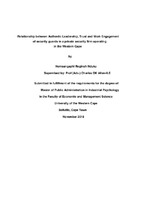Relationship between authentic leadership, trust and work engagement of security guards in a private security firm operating in the Western Cape
Abstract
Globally both public and private businesses are experiencing an enormous number of
challenges posed by both the internal and external environment. However, the private
security industry is not immune to that as they are facing challenges such as, weak and
ineffective regulations and enforcement , long working hours, inconsistent recruitment
and selection standards nonexistence of accountability and transparency which makes
it easy for leaders to be involved in illegal practices, poorly compensations of security
guards with limited or no benefits, low skills because of lack of training often
undertaking dangerous jobs in contentious spaces.
These challenges and allegations attributed to leaders bring about an increase in
stress/workload which in turn can possibly result into loss of trust, and disengagement
on part of security guards against their leaders. According to literature, a new breed of
authentic leaders should be developed in order to overcome these challenges.
Authentic perspective of leadership believed that, this type of leadership display high
degree of integrity has a deep a sense of purpose, and committed to their core values.
Consequently they promote a more trusting working relationship between them and
their employees that can also translate into a motivated and engaged workforce.
The objective of this study was to investigate the relationship between authentic
leadership of supervisors / managers, trust and work engagement of security guards in
a private security firm operating in the Western Cape. A sample of 218 security guards
was chosen through the non-probability convenience sampling with the use of the nonexperimental
cross sectional design. A composite questionnaire consisted of
biographical data section, Authentic Leadership Questionnaire (ALQ), Workplace Trust
Survey (UWES) (Trust in the immediate manager sub-scale), and Utrecht Work
Engagement Scale (UWES) was used in the present study.
The data was analyzed by means of statistical techniques such as factor analysis,
Pearson product-moment correlation analysis, and multiple regression analysis.

